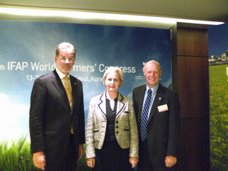In 2001 Ria van Rossum visited India in a prospection mission, in order to pre-evaluate the potential of the Andhra Pradesh Federation of Farmers’ organizations. Van Rossum was a woman farmer, member of the regional LTO organization in the West of the Netherlands (WLTO). She held at the time director positions and was president of the commission development cooperation of the LTO branch. Later she became also president of the advisory council of Agriterra, the Dutch agri-agency. In the five years in office -she stepped back in 2006 when she and her husband decided to retire and sell the farm- she was active in recruiting AgriPool personnel for many assignments. She was also instigator of the WLTO Central Africa collaboration that provided support to organizations in Rwanda, DR Congo and Kenya. In that sense, India was not her mayor contribution, but still one that shows the impact of this type of experts.
Van Rossum concluded from her prospection that the FFAP had potential, especially because of her influential and dedicated president. At the same time it lacked close links with the claimed members. In 2002 she invited president Chengal Reddy for a return visit in allusion of World Food Day. He visited in that period LTO. The relations with WLTO and the focus of Agriterra on exclusively farmers organizations helped FFAP enormously to define itself as a farmers’ organization and break away from the idea of building an NGO type of institution giving support to farmers.
From that point FFAP started to work with Agriterra on the consolidation of the federation through building linkages with 200 existing farmers associations. Van Rossum assisted in the formulation of the support project to FFAP and recruited the head of the trainings unit of WLTO to give leaderships training to FFAP directors. A few years later, FFAP had established 247 local association, trained over 1200 women farm leaders for income generating activities. More important may be for the future of the federation were the outward linkages that were institutionalized with parliamentarians (Agricultural Forum of Congressman) and with the industry (Indian Farmers and Industry Alliance). The influence of the FFAP increased on subjects as credit, access to water, protection of the home market.
Within a few years, guided by the example of farmers’ organizations around the globe, FFAP had built a respected federation with links to many farmers’ organizations in other states. The state plan for agriculture cannot be approved without FFAP have had to say something about them in the press. Advocacy, business development and effective services to members especially on agricultural technology (FFAP is a fervent advocate for biotechnology and advances innovations for agriculture) were the central issues of the ever expanding FFAP. Rural ICT, rural Olympics for young farmers and women, along with an extensive training programme marked the connection with rank and file.
Developments at this point were not longer triggered by Dutch input. Instead Agriterra started to contract the expertise of Anil Epur, the person who was responsible for the connections of FFAP with the industry, as PO-advisor. Among the various dealt by Epur stands out his involvement in introducing colleague organizations in new ICT solutions. Andhra Pradesh is Asia’s Silicon Valley. Some of mango producing associations of FFAP moved to new successes when their productive improvements, networking and advocacy made them interesting for Coca Cola to contract them as preferred supplier for its ‘Frooti’, the number one mango drink in India. Another hit was the establishment of the Confederation of Indian Farmers Associations, an initiative heavily promoted by FFAP in which it explicitly recognized the support of Agriterra and Anil Epur. This institutionalized farmer alliance groups together farmers’ organizations with a total membership of 120 million Indian farmers. Read this figure carefully and reflect on it!
The central issue that emerges from this case is that the Dutch example is that it shows farming India the mirror of its own organizational future; words chosen this way because they recall Karl Marx’ appreciation of British imperialism in India. Chengal Reddy looked into the mirror and knew what to do.
Subscribe to:
Post Comments (Atom)
Check these interesting contributions from other sites & blogs
- On Farmers Organization in Egypt
- Law on farmers Organizations in China
- Interview with FAO officials on Farmers Organizations
- Farmers use mobile phones
- comment of Kees Blokland on anti-CAP campaigning
- Poverty & growth blog of the World Bank
- Gapminder statistics visualized
- Guide for implementing ICT projects - iCommons december 2006
- Africa: tools of liberalisation - Patricia Daniel, University of Wolverhampton, England
- Business and the rural poor - Harvard Business School
- Profiling Asian Farmers Association members - Jan 4th, 2007
- Fiji Times report on AgriCord grants to Sugar Farmers - January 04, 2007
- Increasing Impact - marrying micro-credit and micro-insurance - The disconfort Zone, january 4th, 2007
- Programs that Fight Poverty - Institute for Advanced Technologies in Global Resilience - November 17, 2006
- University of Chicago Press Journals reports on GMOs - January 25, 2007
- Biotech crops to help reduce poverty - Kauser A Malik, in the Daily Times (Pakistan) January 25, 2007
- Why does China grow so fast - Michael Spence The Wall Street Journal 23 january 2007






No comments:
Post a Comment